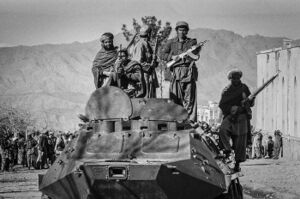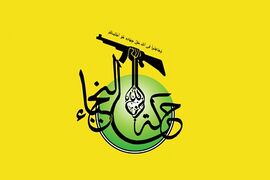Rusani Civil War: Difference between revisions
mNo edit summary Tag: 2017 source edit |
m Text replacement - "Corummese" to "Daxian" |
||
| Line 25: | Line 25: | ||
===Demographic and socioeconomic factors=== | ===Demographic and socioeconomic factors=== | ||
The FDH drew most of its support from Ghanim, which prior to unification was both the largest and poorest kingdom. The kings of Ghanim had vigorously encouraged the spread of rigid versions of Islam through a system of madrassas. As a result many rural poor were easily swept up by new political parties that pursued islamic government such as Jamaat-e-Islami, a position that General Javad Spabod would lean into in order to broaden his support beyond the army. At Spabod's insistence, many retrograde punishments were instituted such as executions for blasphemy or insulting religion. In an effort to pander to his religious base of support, Spabod and his FDH faction also adopted a discriminatory tone against Rusana's many minority groups such as the Kassar people, ethnic | The FDH drew most of its support from Ghanim, which prior to unification was both the largest and poorest kingdom. The kings of Ghanim had vigorously encouraged the spread of rigid versions of Islam through a system of madrassas. As a result many rural poor were easily swept up by new political parties that pursued islamic government such as Jamaat-e-Islami, a position that General Javad Spabod would lean into in order to broaden his support beyond the army. At Spabod's insistence, many retrograde punishments were instituted such as executions for blasphemy or insulting religion. In an effort to pander to his religious base of support, Spabod and his FDH faction also adopted a discriminatory tone against Rusana's many minority groups such as the Kassar people, ethnic Daxian muslims, Christians and other groups that he tried to marginalize and harass in public discourse. | ||
The NCDP forces for its part were largely drawn from the more diverse and wealthier south of the country. Farrukhzad Khosa soon began to make inroads with communities being targeted by the FDH, promising them weapons if they joined up with his forces. Groups as disparate as the Kassar Front, the Christian Defense Party, the communists and | The NCDP forces for its part were largely drawn from the more diverse and wealthier south of the country. Farrukhzad Khosa soon began to make inroads with communities being targeted by the FDH, promising them weapons if they joined up with his forces. Groups as disparate as the Kassar Front, the Christian Defense Party, the communists and Daxian separatists joined the banner of the NCDP to topple Spabod and his group from power. Neighbouring [[Corumm]], being wary of irredentist claims made by Spabod also began supporting the NCDP with weaponry and ammunition. | ||
<gallery mode=packed> | <gallery mode=packed> | ||
File:Flag_of_Janad_Region_(Yemen).svg|Flag used by the Front for the Defense of the Homeland(FDH) | File:Flag_of_Janad_Region_(Yemen).svg|Flag used by the Front for the Defense of the Homeland(FDH) | ||
Revision as of 00:05, 29 April 2023
| Rusani Civil War | |||||||
|---|---|---|---|---|---|---|---|
 Fighters aligned with the FDH at a mustering point in Fazil province | |||||||
| |||||||
| Belligerents | |||||||
|
|
Supported by: | ||||||
| Commanders and leaders | |||||||
|
File:Fadayeen Islam Flag.jpg Mirza Baqri |
| ||||||
| Strength | |||||||
| 150,000 | 130,000 | ||||||
| Casualties and losses | |||||||
|
Military dead: 90,000+ |
Military dead: 78,000+ | ||||||
The Rusani Civil War was an internal conflict that took place in the Islamic Republic of Rusana from 1953 to 1965 between two armed coalitions vying for control of the country. The Front for the Defense of the Homeland or FDH was a grouping of conservative and islamist forces which included the officer core of the old Ghanim national army and the Jamaat-e-Islami and Party of God political parties which advocated the imposition of Sharia law and islamism. Notably the Sunni Jamaat and the Shia Party of God put aside their sectarian division aside for most of the war. In opposition to the FDH stood the National Congress for the Defense of the People or NCDP composed of military and tribal elites from regions opposed to the centralization efforts of Javad Spabod, the Unity Party and minority ethnic and religious groups wary of the FDH's islamist program. The civil war went on for a grueling twelve years, devastating the country's economy and creating lasting enmities between its ethnic groups. The Corummese directly intervened in 1962 and attacked the FDH, fatally weakening it in the final years of the war before the NCDP delivered the final blow.
Background
Unification process
The unification of Rusana in 1947 was achieved after a rapid and disorderly process inspired by the underground Unity Party and led by three separate officer plots from the armies of Ghanim, Lakdu and Barpubad. The overthrow of the monarchies gave way to rule by a military junta who could not agree on the way forward. The failure to replace the monarchist system with a truly democratic and representative democracy allowed resentment and suspicion to begin festering not only between the population and the regions but also inside the allegedly newly united army command. As the most heavily populated area, military officers and functionaries from Ghanim wasted no time trying to monopolize positions in the state and budget allocations, against the spirit of the unification process. Soon the other regions began acting in like manner in order to prevent Ghanim elites from taking over the entire state apparatus.
Fragmentation of the Army
The Rusana Revolutionary Military Command that was supposed to take charge of the nation was a body that quickly became riven with factionalism and regionalism, all worsened by egocentric and paranoid officers like Javad Spabod and Farrukhzad Khosa, who maintained a bitter rivalry for control of the junta. In seeking to gain an edge, these men built networks of patronage and divided the army along regional lines, as it existed before unification. The situation became so tense that General Spabod ordered all units from Lakdu to leave the capital, which led to an armed standoff that was only resolved through the intervention of the capital's chief imam. To bolster their positions, the generals began courting organizations they had previously suppressed or ignored such as various hardline islamist currents, fringe political parties and minority ethnic groups.
Demographic and socioeconomic factors
The FDH drew most of its support from Ghanim, which prior to unification was both the largest and poorest kingdom. The kings of Ghanim had vigorously encouraged the spread of rigid versions of Islam through a system of madrassas. As a result many rural poor were easily swept up by new political parties that pursued islamic government such as Jamaat-e-Islami, a position that General Javad Spabod would lean into in order to broaden his support beyond the army. At Spabod's insistence, many retrograde punishments were instituted such as executions for blasphemy or insulting religion. In an effort to pander to his religious base of support, Spabod and his FDH faction also adopted a discriminatory tone against Rusana's many minority groups such as the Kassar people, ethnic Daxian muslims, Christians and other groups that he tried to marginalize and harass in public discourse.
The NCDP forces for its part were largely drawn from the more diverse and wealthier south of the country. Farrukhzad Khosa soon began to make inroads with communities being targeted by the FDH, promising them weapons if they joined up with his forces. Groups as disparate as the Kassar Front, the Christian Defense Party, the communists and Daxian separatists joined the banner of the NCDP to topple Spabod and his group from power. Neighbouring Corumm, being wary of irredentist claims made by Spabod also began supporting the NCDP with weaponry and ammunition.
-
Flag used by the Front for the Defense of the Homeland(FDH)
-
Flag used by the National Congress for the Defense of the People(NCDP)
-
Flag of Jamaat-e-Islami
-
Flag of the Kassar Front
-
Flag of the Party of God
Warfare
FDH takeover of the North (March 1953-December 1954)
On March 3 forces loyal to Javad Spabod swept into Tabish on the pretext of securing the rule of the junta from 'putschist elements' gathered around the figure of Farrukhzad Khosa. Speaking on the radio, Spabod announced the expulsion of Khosa and his allies from the revolutionary command and ordered their arrest. As the announcement was taking place, fighting broke out in the city with army units loyal to Khosa but by March 5th they were forced to fully retreat to positions twenty kilometers to the south. The military airport and other key parts of the city such as the central bank were captured without much resistance. Sporadic protests were put down forcefully, with at least seven protestors being shot dead by soldiers. Elsewhere in the Ghanim governorate, local garrisons pledged allegiance to the defacto FDH government in Tabish as was expected. Attacks on christians started out in Tabish before being controlled by the army. The christian villages of Maruta and Keshem in north eastern Ghanim which declared neutrality were bombarded with howitzers and submitted, with the citizens allegedly being forced to kiss copies of the Quran by militiamen of Jamaat-e-Islami. FDH forces continued striking south towards Darbah, breaking two defensive lines and nearly overrunning NCDP units guarding the city's flanks. The offensive fizzled out due to reinforcements being brought to Darbah, complicating efforts to fully encircle the city and evict Khosa's forces from the north. The siege continued well into 1954 as Khosa's army fought hard to keep the M12 highway from enemy hands, this being their most critical route to deliver supplies to the city. By december of the same year, the FCH gained fire control of the highway, preipitating the decision by Khosa to order a retreat from Darbah, which was completed by the end of the month after incurring severe casualties to artillery attacks. The defeat at Darbah consolidated FDH control of the country north of the Mursi river while the battlefield casualties incurred by Khosa's forces made him initiate efforts to bring in the disparate southern groups into his nascent NCDP.
FDH Southern Offensive (March 1955-August 1956)
Ceasefire (August 1956-February 1957)
3rd of March Martyrs Counteroffensive (March 1957-May 1958)
Positional warfare (June 1958-December 1962)
The Little Incursion (December 1962-August 1963)
Qiu Heng orders military intervention on behalf of the NCDP

